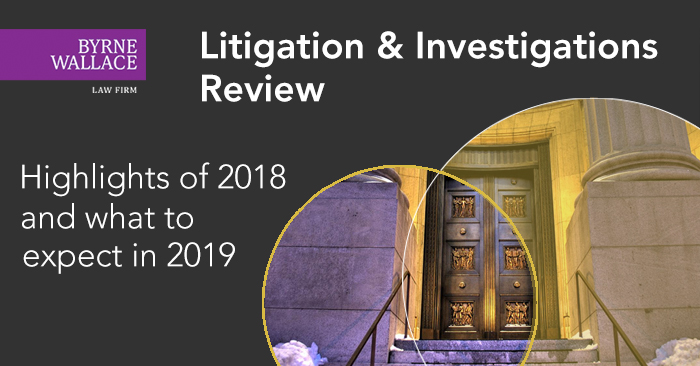Litigation & Investigations Review - Highlights of 2018 and what to expect in 2019
Thursday, 31 January 2019
In our review of 2018, we outline some of the major developments that occurred in Litigation and Investigations:
Brexit
It is not possible to look to the year ahead without referring to Brexit which continues to present much uncertainty. Once the UK leaves the EU, Ireland will be uniquely placed as the only English speaking common law country. As the Chief Justice Frank Clarke stated in September 2018, Ireland can provide a “safe haven" in the midst of all the uncertainty. This will afford Ireland the opportunity to become a greater location for international litigation, dispute resolution and arbitration. We also expect to see increased transport, trade and shipping problems as well as export disputes and logistical difficulties. Brexit will also create issues relating to contract terms and enforceability.
To Mediate or Not to Mediate?
2018 commenced with the Mediation Act 2017 coming into force, which had immediate implications for civil litigation. A solicitor is now required to advise his/her client to consider mediation as a means of attempting to resolve the dispute prior to any proceedings being issued. The Court of Appeal made it clear in Danske Bank & Anor v S.C [2018] IECA 117 that a party will not be allowed by the Court to abuse the Mediation Act for the purposes of delay or to strengthen their bargaining position in respect of costs.
Protection of Data
In May 2018, the EU General Data Protection Regulation (GDPR) came into force, introducing new obligations and financial penalties arising from data breaches. With a significant increase in its budget the Data Protection Commission (DPC) is likely to be far more active this year in its role as a Supervisory Authority. In 2018 we advised clients preparing for and post GDPR. We had increased activity in investigations, appeals, and Data Subject Access Requests. It is inevitable that data subject litigation will increase this year. Data subjects are now entitled to damages for a breach of their data protection rights without having to demonstrate that actual loss was suffered.
Corporate Corruption
The Criminal Justice (Corruption Offences) Act of 2018 came into force on 30 July 2018. This act overhauls Ireland’s existing anti-corruption legislation and has far reaching effects creating new offences, and tougher penalties. One of the key aspects is a new corporate liability offence where a body corporate may be found guilty if anyone acting on behalf of that body commits a corruption offence, and could face an unlimited fine. This legislation is likely to have a significant impact on companies and other corporate entities operating in Ireland.
Disclosure of documents
The decision of the Court of Appeal in Tobin v Minister for Defence [2018] IECA 230 could have a significant impact on the discovery phase of litigation. The Court of Appeal held that parties to litigation should exhaust all reasonable avenues to obtain information before resorting to extensive discovery requests. The impact of this decision remains to be seen and whether parties will adopt the "co-operative" approach encouraged by the Court of Appeal, otherwise the risk remains that the litigation process will continue to be burdened by extensive discovery requests.
Public Procurement
The Remedies Regulations impose obligations on contracting authorities to provide reasons to tenderers. In Sanofi Aventis Ireland Limited v Health Service Executive [2018] IEHC 566 the High Court held that the adequacy of the reasons can only be assessed on the basis of the reasons provided prior to the commencement of the proceedings. In addition, there is no duty on a contracting authority to provide reasons to an unsuccessful tenderer where that tenderer achieved the same/a higher mark than the successful tenderer.
Professional Negligence
The Supreme Court in Rosbeg Partners v LK Shields [2018] IESC 23 considered whether the negligence of the defendant firm made it responsible for some or all of the losses suffered by the plaintiff by reason of the decline of the property market and its own market decisions. The Supreme Court in reducing award of damages from €11,077,000 to €5,245,500 held that if the market is static or rising, it may be that there would be no liability for damages. However where the market is falling, then the plaintiff is entitled to recover the difference in value of the property between the date when the defendant ought to have performed its duty and the point at which the problem could reasonably have been remedied.
Access to Court documents
Since 1 August 2018, the media can access documents opened (or taken to have been opened) in Court. This potentially means that documents filed in Court proceedings which might refer to commercially sensitive and/or confidential information may be accessed by the media even if the content has not necessarily been read out in court.
Legal Costs
It is expected that 2019 will see the commencement of sections of Legal Services Regulation Act 2015 Act dealing with legal costs which are far ranging. These will put greater obligations on legal practitioners to make and keep clients aware of legal costs by providing written notices at the commencement and throughout the duration of a retainer. It also provides for “cooling off” periods and for revised procedures for the resolution of disputes in relation to costs.
For more information on the above or for general Litigation and Investigations advice, please contact any member of the ByrneWallace Litigation and Investigations team.
To register for ByrneWallace updates click here, and follow us on LinkedIn.
The content of this article is provided for information purposes only and does not constitute legal or other advice.

